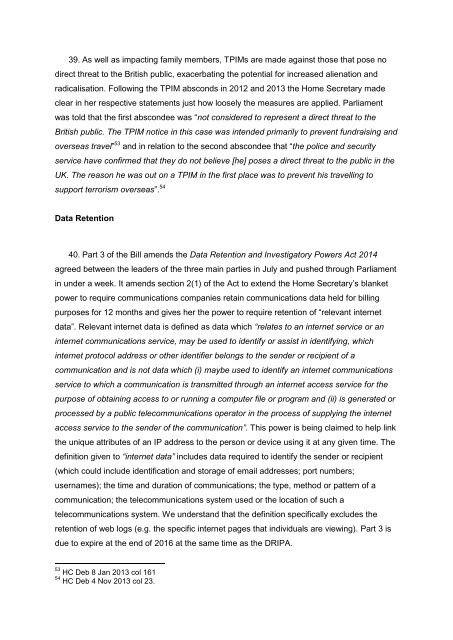Liberty's Second Reading Briefing on the Counter-Terrorism & Security Bill in the House of Commons
Liberty's Second Reading Briefing on the Counter-Terrorism & Security Bill in the House of Commons
Liberty's Second Reading Briefing on the Counter-Terrorism & Security Bill in the House of Commons
Create successful ePaper yourself
Turn your PDF publications into a flip-book with our unique Google optimized e-Paper software.
39. As well as impact<strong>in</strong>g family members, TPIMs are made aga<strong>in</strong>st those that pose no<br />
direct threat to <strong>the</strong> British public, exacerbat<strong>in</strong>g <strong>the</strong> potential for <strong>in</strong>creased alienati<strong>on</strong> and<br />
radicalisati<strong>on</strong>. Follow<strong>in</strong>g <strong>the</strong> TPIM absc<strong>on</strong>ds <strong>in</strong> 2012 and 2013 <strong>the</strong> Home Secretary made<br />
clear <strong>in</strong> her respective statements just how loosely <strong>the</strong> measures are applied. Parliament<br />
was told that <strong>the</strong> first absc<strong>on</strong>dee was “not c<strong>on</strong>sidered to represent a direct threat to <strong>the</strong><br />
British public. The TPIM notice <strong>in</strong> this case was <strong>in</strong>tended primarily to prevent fundrais<strong>in</strong>g and<br />
overseas travel” 53 and <strong>in</strong> relati<strong>on</strong> to <strong>the</strong> sec<strong>on</strong>d absc<strong>on</strong>dee that “<strong>the</strong> police and security<br />
service have c<strong>on</strong>firmed that <strong>the</strong>y do not believe [he] poses a direct threat to <strong>the</strong> public <strong>in</strong> <strong>the</strong><br />
UK. The reas<strong>on</strong> he was out <strong>on</strong> a TPIM <strong>in</strong> <strong>the</strong> first place was to prevent his travell<strong>in</strong>g to<br />
support terrorism overseas”. 54<br />
Data Retenti<strong>on</strong><br />
40. Part 3 <strong>of</strong> <strong>the</strong> <strong>Bill</strong> amends <strong>the</strong> Data Retenti<strong>on</strong> and Investigatory Powers Act 2014<br />
agreed between <strong>the</strong> leaders <strong>of</strong> <strong>the</strong> three ma<strong>in</strong> parties <strong>in</strong> July and pushed through Parliament<br />
<strong>in</strong> under a week. It amends secti<strong>on</strong> 2(1) <strong>of</strong> <strong>the</strong> Act to extend <strong>the</strong> Home Secretary’s blanket<br />
power to require communicati<strong>on</strong>s companies reta<strong>in</strong> communicati<strong>on</strong>s data held for bill<strong>in</strong>g<br />
purposes for 12 m<strong>on</strong>ths and gives her <strong>the</strong> power to require retenti<strong>on</strong> <strong>of</strong> “relevant <strong>in</strong>ternet<br />
data”. Relevant <strong>in</strong>ternet data is def<strong>in</strong>ed as data which “relates to an <strong>in</strong>ternet service or an<br />
<strong>in</strong>ternet communicati<strong>on</strong>s service, may be used to identify or assist <strong>in</strong> identify<strong>in</strong>g, which<br />
<strong>in</strong>ternet protocol address or o<strong>the</strong>r identifier bel<strong>on</strong>gs to <strong>the</strong> sender or recipient <strong>of</strong> a<br />
communicati<strong>on</strong> and is not data which (i) maybe used to identify an <strong>in</strong>ternet communicati<strong>on</strong>s<br />
service to which a communicati<strong>on</strong> is transmitted through an <strong>in</strong>ternet access service for <strong>the</strong><br />
purpose <strong>of</strong> obta<strong>in</strong><strong>in</strong>g access to or runn<strong>in</strong>g a computer file or program and (ii) is generated or<br />
processed by a public telecommunicati<strong>on</strong>s operator <strong>in</strong> <strong>the</strong> process <strong>of</strong> supply<strong>in</strong>g <strong>the</strong> <strong>in</strong>ternet<br />
access service to <strong>the</strong> sender <strong>of</strong> <strong>the</strong> communicati<strong>on</strong>”. This power is be<strong>in</strong>g claimed to help l<strong>in</strong>k<br />
<strong>the</strong> unique attributes <strong>of</strong> an IP address to <strong>the</strong> pers<strong>on</strong> or device us<strong>in</strong>g it at any given time. The<br />
def<strong>in</strong>iti<strong>on</strong> given to “<strong>in</strong>ternet data” <strong>in</strong>cludes data required to identify <strong>the</strong> sender or recipient<br />
(which could <strong>in</strong>clude identificati<strong>on</strong> and storage <strong>of</strong> email addresses; port numbers;<br />
usernames); <strong>the</strong> time and durati<strong>on</strong> <strong>of</strong> communicati<strong>on</strong>s; <strong>the</strong> type, method or pattern <strong>of</strong> a<br />
communicati<strong>on</strong>; <strong>the</strong> telecommunicati<strong>on</strong>s system used or <strong>the</strong> locati<strong>on</strong> <strong>of</strong> such a<br />
telecommunicati<strong>on</strong>s system. We understand that <strong>the</strong> def<strong>in</strong>iti<strong>on</strong> specifically excludes <strong>the</strong><br />
retenti<strong>on</strong> <strong>of</strong> web logs (e.g. <strong>the</strong> specific <strong>in</strong>ternet pages that <strong>in</strong>dividuals are view<strong>in</strong>g). Part 3 is<br />
due to expire at <strong>the</strong> end <strong>of</strong> 2016 at <strong>the</strong> same time as <strong>the</strong> DRIPA.<br />
53 HC Deb 8 Jan 2013 col 161<br />
54 HC Deb 4 Nov 2013 col 23.


